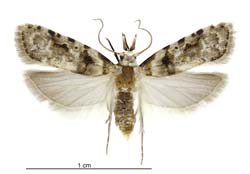Australian guava moth facts for kids
Quick facts for kids Australian guava moth |
|
|---|---|
 |
|
| Scientific classification | |
| Kingdom: | |
| Phylum: | |
| Class: | |
| Order: | |
| Family: |
Carposinidae
|
| Genus: |
Coscinoptycha
Meyrick, 1881
|
| Species: |
C. improbana
|
| Binomial name | |
| Coscinoptycha improbana Meyrick, 1881
|
|
The Australian guava moth, also known as Coscinoptycha improbana, is a small moth. It belongs to a family of moths called Carposinidae. This moth is special because it's the only known species in its group, called the Coscinoptycha genus.
This moth originally comes from Australia. You can find it in places like Queensland, New South Wales, Victoria, and Tasmania. It has also spread to Norfolk Island and was first seen in New Zealand in 1997. More recently, in 2012, it was found in New Caledonia.
Life of the Australian Guava Moth
Adult Australian guava moths can be seen flying around all year long. They are quite active throughout the seasons.
What Larvae Eat
The young moths, called larvae or caterpillars, are known for eating different kinds of fruit. They especially like fruits from plants such as:
- Guava (like the common guava fruit)
- Feijoa
- Macadamia nuts
- Loquat
- Plums and Peaches
- Nashi pears
- Various Citrus fruits (like Lemons and mandarins)
- Red olive-berry
- Schizomeria ovata (a native Australian tree)
How Larvae Damage Fruit
These tiny larvae are quite clever. They bore into the fruits of their host plants. This means they tunnel inside the fruit while it is still growing on the tree.
- Young larvae, usually the first to fourth stage, live inside ripening fruit.
- In some fruits, like loquats, macadamias, and peaches, the larvae will feed inside the hard kernel or seed.
- When the fruit falls to the ground, the larvae make an exit hole. They then leave the fruit to change into pupae, which is the next stage before becoming an adult moth.
Images for kids


